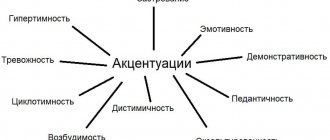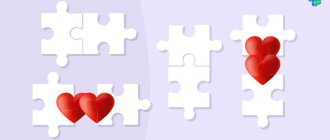What is “character”
In psychology, character refers to the totality of a person’s personal qualities that are formed as they grow older and are most clearly manifested in personal and public life. As a result, a specific style of behavior is formed in different life situations.
Psychologists divide character traits into 4 groups. This division is based on a person’s attitude to various aspects of life.
- Towards other people – isolation or sociability, deceit or truthfulness, respect or arrogance, etc.
- Towards oneself – modesty or vanity, arrogance or self-criticism, pride or humility, etc.
- To work – hard work or laziness, conscientiousness or carelessness, etc.
- To things – neatness or sloppiness, thrift or wastefulness, neatness or negligence, etc.
Since the main personality traits are formed in social life, the main aspect for understanding a person’s character is his relationships with other people. A person's character is also judged by his temperament. But it is important to distinguish between these concepts.
Nobility
Nobility is considered one of the most important positive qualities of any person. This quality refers to the natural good manifestations of human nature, which are not determined by any rules, laws, prohibitions or regulations.
A noble person feels the need to serve good motives, and not rely on his base carnal desires. Only a noble person knows firsthand such concepts as valor, honor, kindness and mutual assistance. In a difficult situation, he will always come to the rescue, without thinking about his own benefit or expecting gratitude.
How is temperament related to a person’s character?
A person’s character is a combination of his personal qualities, which can change and depend on the social environment in which the individual lives and develops. Temperament is an innate reaction to external stimuli. It does not change and remains constant throughout a person’s life.
Knowing the type of temperament, you can better understand the character of a person. However, a pronounced temperament is extremely rare. Most often, people have a mixed temperament, in which there will definitely be a dominant one.
It is customary to distinguish the following 4 types of temperament; on our website there are detailed articles devoted to each of them.
- Choleric. It is characterized by sudden changes in mood, emotional outbursts, impetuosity, passion, and imbalance. The nervous system of choleric people is characterized by unstable functioning. When a choleric person gets very involved in something, he very quickly uses up his own energy and becomes exhausted.
- Sanguine. This is the most sociable and lively of all temperament types. He needs new impressions, quickly reacts to events happening around him, and takes his own failures and other troubles lightly. When a sanguine person is interested in work, he works very productively and with great enthusiasm. In the opposite situation, he becomes frankly bored and is absolutely indifferent to the result.
- Phlegmatic person. He is distinguished by his equanimity and slowness. A phlegmatic person shows feelings extremely sparingly. He is constant in his preferences and habits and does not tolerate any changes. A phlegmatic person prefers monotonous work, which he performs diligently and without rushing.
- Melancholic. This is the most sensitive and vulnerable type of temperament. A melancholic person reacts sharply to various events and is prone to strong emotional experiences. With a favorable upbringing, melancholic people turn out to be outstanding figures in the arts and sciences.
If you can no longer change your temperament, then you can work on your character. First, you need to determine your character type and key traits.
Positive qualities of women
1. Thrift
A woman is the keeper of the family hearth - this is an indisputable fact, despite the fact that many men also claim this place, they still cannot do a better job than women, so every woman should be thrifty. Thrift should be shown in everything: value for money, quality and taste, tasty and healthy, necessary and optional. Only a thrifty woman will correctly plan the family budget and easily save money for a summer vacation.
2. Meekness
Despite the fact that this quality was highly valued in the Middle Ages and the times of our ancestors, it has not lost its relevance today. Yes, men love to spend time with relaxed, brave and self-confident women, but they take modest and meek women as wives, so think twice before pretending to be a vamp in front of a potential groom.
3. Patience.
Without this quality, a woman will not go far in family relationships, especially after she has children. Patience helps you look at things correctly and soberly, forgive various pranks, and not make mountains out of molehills. Only a patient woman can create a strong marriage.
4. Tenderness.
A smart woman will always give her man love and tenderness, because this is the only way to control your other half. A gentle woman will always get what she wants.
Classification of character types
Scientists and psychologists have identified a large number of criteria for determining character type. I'll tell you about the main ones.
Typology according to Kretschmer
German psychologist Ernst Kretschmer classified character types depending on a person’s physique and identified 3 main ones.
- Picnics. People of this type of physique are prone to being overweight and even obese; they are rarely above average height. They have a small head with a short neck, a wide face with small features. They correspond to a character type called cyclotomy. These are people who are characterized by emotionality, sociability, who easily make contact and quickly adapt to changing conditions. The most common mental illness is manic-depressive psychosis.
- Asthenics. These include people of thin build, weak muscles, long arms and legs, and a long face. The character type of asthenics is schizothymic. They are characterized by stubbornness, seriousness and isolation. With mental disorders they are prone to schizophrenia.
- Athletics . These people are tall, broad-shouldered, muscular with a strong skeleton. The character type of athletes is ixothymic. They are characterized by restraint in facial expressions and gestures, calmness and restraint, authority and practicality. They do not like change because they do not adapt well to it. The most common mental disorder among athletes is epilepsy.
It is interesting that people of the same race have similar character traits. Thus, the Swedish professor Anders Retzius introduced the concept of the Nordic character, which was possessed by representatives of the Germanic race. These are tall and slender people with blue or gray eyes and light ash hair. They are persistent, cool-headed, reserved, reasonable and very observant. They know how to remain calm in any situation.
Typology according to Jung
Carl Gustav Jung is a Swiss psychiatrist who developed a typology of character, which is based on the predominance of a person’s internal or external world. He identified 2 types of people.
- Introverts. These are closed people, turned to their inner world. Such people are focused thinkers. They isolate themselves from the outside world, analyze everything carefully, and prefer loneliness. They have few friends, it is difficult for them to make new acquaintances and change their habits. They are characterized by suspiciousness and increased anxiety.
- Extroverts. These are sociable, sociable, open people. They have a lot of friends and acquaintances, they cannot stand loneliness, they love to travel and live to the fullest. They always become the life of the party, initiating meetings and parties.
Typology according to Lowen
American psychoanalyst Alexander Lowen compiled his typology of characters based on defensive patterns of human behavior. In total, he identified 5 types.
- Oral. Representatives of this type of character depend on the opinions of others and are afraid of being abandoned and rejected. They are characterized by strong dependence on other people, constantly in need of love, care and support, but they themselves are not ready to do anything.
- Masochistic. People with this type of character tend to complain, engage in self-flagellation, love to suffer themselves and torment other people. Everything that causes displeasure to others brings pleasure to the masochist. He doesn't trust anyone, often hates everyone and harbors a grudge.
- Hysterical. This type of character is characterized by reckless outbursts of emotions and theatrical behavior. Women of the hysterical type are distinguished by their overt coquetry, which is expressed in their gait, speech and gaze. Lack of discharge as a result of excess energy leads to anxiety. However, such people cannot remain in a state of balance for a long time. They perceive calmness as a boring and gray life and try in every possible way to recharge themselves, deliberately getting into various ambiguous situations.
- Narcissistic. This type of character is characteristic mainly of men. Its representatives are energetic, ambitious, self-confident and often arrogant. They achieve success in their professional activities, persistently achieve their goals, and are sexually attractive to the opposite sex. Their distinctive features are also pressure, aggressiveness and fight.
- Schizoid. People of this type of character are divorced from reality and cannot adequately express their emotions. They know how to love, but this feeling will not last long, since attempts to maintain contact cause strong internal tension in a schizoid person, which causes a break.
People who 100% fit the description of a particular character type are quite rare. Most often, character traits are intertwined and none stands out too clearly.
What is accentuation
When individual character traits are overly enhanced, this is called character accentuation. From a psychological point of view, this condition is an extreme variant of the norm, and not a mental illness. However, at the same time, some character traits are sharpened and expressed so strongly that they lead to personality disharmony.
This feature leaves an imprint on a person’s behavior and actions, which is reflected in all areas of relationships: to oneself, to other people, to work, to things. Character accentuation is most common among adolescents. Thus, among the surveyed young people, 95% were found to have accentuation of varying degrees of severity. But among the older generation, the proportion of people with accents dropped to 60%. Because with age it is possible to smooth out undesirable character traits.
Example of positive qualities for a resume
Positive qualities for an accountant position:
- analytic skills; — scrupulousness; — diligence; - attentiveness.
Positive qualities for a teacher position:
- communication skills; — responsiveness; - hard work; - stress resistance.
Next, the resume item “negative qualities” is not entirely pleasant for all applicants. Not everyone wants to focus on this, and they don’t want to appear in an unfavorable light to a potential employer. But you must remember that this point has, to some extent, even more advantages than disadvantages to the resume, the main thing is to fill it out correctly.
When indicating negative qualities, you should not go far from the essence of the future work, otherwise there is no point in indicating them at all, but for the recruiter it will look like an easy way to remain silent, to avoid answering. This will be a mistake, because we are all not perfect.
Start with self-criticism, analyze yourself, remember everything that you were ever reproached with at previous jobs or at home. Now, from the list of your inherent shortcomings, select a couple of the most tolerable and more or less tolerable ones, those that will not affect the effectiveness of your work. The main thing is to avoid vague phrases and vague expressions.
Remember that correctly identified and presented shortcomings can play into your hands and win over the HR manager who is reviewing your resume. Pointing out one's shortcomings to oneself indicates that a person has an inherent normal perception of criticism, a willingness to improve and correct himself.
The main thing you should take into account when filling out the section of negative qualities in your resume is that all negative qualities are strictly individual, so you shouldn’t fantasize or twist too much, because sooner or later they will still appear in your work.
Character types with accentuation
Many scientists and psychologists have studied accentuation and tried to classify character type depending on this phenomenon. The typologies of A. E. Lichko and K. Leonhard gained the most popularity.
Classification according to Leonard
Karl Leonhard in his work “Accented Personalities” identified 10 main types and several intermediate ones.
- Hyperthymic – sociable, optimistic, energetic, proactive type of accentuation. Hyperthymic people are luck-oriented. They are characterized by developed facial expressions, a desire for active activity and new experiences. Often people of this type are irritable and frivolous.
- Disthymic is a closed, pessimistic person with a heightened sense of injustice. A dysthymic person feels discomfort in noisy companies. He has few friends, but he values them very highly. He is characterized by inhibition and low speed in decision making.
- An excitable person is a conflict-ridden person who is very difficult to communicate with. It is difficult for him to get along in a team, and in the family he behaves imperiously.
- A stuck person is a suspicious, intractable and touchy person. Such people love to teach others and often become the initiators of conflicts. They tend to place high demands on both themselves and others.
- Demonstrative - a self-confident, vain, boastful and hypocritical person. Such people love to weave intrigues and can easily adapt to any situation. They are characterized by artistry, courtesy, out-of-the-box thinking and self-centeredness.
- An anxious person is a timid, submissive, insecure person. He is characterized by self-criticism and friendliness. However, the lack of inner strength and will often makes such people the subject of ridicule and jokes. For the same reason, they try to avoid conflicts. And if they still had to get into an argument, they will look for support from others.
- Emotive – emotional and soft-hearted type of people. They are characterized by compassion and depth of feelings. They react sharply to everything that happens, but do not express their feelings, but accumulate them within themselves.
- Pedantic - an indecisive type of people who are afraid to lead, pay a lot of attention to little things and will never miss the opportunity to grumble. They are characterized by a fear of inconsistency with their own invented ideals.
- Exalted is a sincere, altruistic and impressionable person. Such people react violently to current events. From joyful events they easily become enthusiastic, and from sad events they become sad and even fall into despair. At the same time, they clearly express their emotions.
- Affectively labile is a type of accentuation in which a person is characterized by frequent mood changes. Therefore, when communicating with people, the way a labile person behaves can differ radically. Either he is hyper-communicative, or on the contrary, he is so withdrawn that you can’t get a word out of him.
Classification according to Lichko
Andrey Evgenievich Lichko identified the following types of accentuations.
- Hyperthymic is an energetic and sociable person who is constantly in a high mood. He cannot stand loneliness, monotonous surroundings, monotonous work, or idleness. He is characterized by a desire for risk, a frequent change of hobbies, as a result of which he does not complete the work he has begun.
- Cycloid is a type of accentuation characterized by cyclical changes in mood. For example, an elevated mood gives way to depression. Such changes do not occur abruptly and last up to about 2 weeks. People of this type are quite sociable and cheerful. However, during periods of low mood, they tend to give up on things.
- Labile is a sociable, good-natured and sincere person, whose main feature is a sharp and rapid change of mood. A labile person experiences severe mental pain when lost or separated from loved ones. He needs support and love. He likes to be in the role of a ward.
- Epileptoid is a scrupulous, meticulous, overly pedantic person. He is characterized by authoritarianism. He has a hard time experiencing material losses and insubordination of his personality. Sometimes he falls into periods of angry and irritable tension, during which he looks for an object to vent his anger. When intoxicated, he becomes angry and aggressive. Most often found in guys.
- Hysterical is an egocentric, communicative and proactive type of character. People of this type crave to be the center of attention. They are quite artistic, easily get used to any role they come up with, and are capable of self-deception. Most often, this type of character manifests itself in girls.
- Psychasthenic – self-critical, prone to introspection, but at the same time a reliable person. It is difficult for him to make decisions and take responsibility for himself and others. He is characterized by prudence and an even mood.
- Schizoid is a closed and taciturn person. It is difficult for such people to establish emotional contacts. Their inner world is closed to others. Alcohol helps schizoids make contact with other people easier and makes them more confident.
- Hypochondriacal – a serious, stubborn, withdrawn person. Has a tendency to increased fatigue and irritability. This type of person experiences sudden outbursts of rage over insignificant reasons.
- Sensitive - timid, shy, shy type of people. They tend to show kindness and mutual assistance. In difficult situations, they withdraw into themselves, become cautious and suspicious.
- Unstable - sociable, open, helpful, lazy person. Loves entertainment and idle pastime. They strive to get rid of someone's control. They have a tendency to drink alcohol and drugs.
- Conformal – a friendly, non-conflict, disciplined type of person. They strive to be “like everyone else.” They have a hard time experiencing changes in life and changes in their usual environment.
Positive qualities of men
1. Courage
Of course, this is the most important male quality, since a man who has courage takes responsibility for his family and his loved ones. He is the head of the family, does the hardest work and makes the most difficult decisions. The concept of “courage” also includes awareness of the fact that a man is the breadwinner of the family, who must provide for all its members.
2. Wisdom
While a woman can afford to make some mistakes, a man, alas, cannot. Wisdom helps a man make the right decisions, achieve heights and achieve universal recognition. A stupid man will never get off a woman’s neck and will not be able to achieve anything in this life.
3. Determination
Our life very often requires us to take bold and decisive actions. If a person is indecisive, he may miss his happiness, and luck will turn away from him. Of course, a woman can also be decisive, and in some cases, she should be, but still, it is better to shift this quality onto the shoulders of men.
4. Reliability
A reliable man always keeps his word and fulfills his promises; it’s a pleasure to deal with such people; they will never let you down.
So, there are a lot of positive qualities, and if you have much greater good qualities, that’s a huge plus for you. Control and educate yourself so that only goodness fills your heart and soul, try to eradicate evil, and then luck will smile on you, which, by the way, loves only good and kind people. Be happy and kind, both to loved ones and to strangers!
Writing a resume is a responsible and very delicate process. Here you list everything about yourself, what the employer will pay you money for if you are suitable for him. In order to skillfully and competently present yourself, you need to analyze the scope of the company’s activities, understand what your potential employer is willing to pay you money for, and what will be considered unworthy of even attention.
So, you have come to the section “ Positive and Negative Qualities for a Resume”
" The main thing you need to consider here is to be honest and concise. It will be much easier for a recruiting manager to evaluate you as a potential candidate for a position by seeing yours, made up of several points, so you won’t over-praise yourself and won’t seem boring.
Let's start with the positive qualities for a resume. Applicants often list all sorts of personal qualities that are suitable for the position, or completely unrelated to the job. This is a huge mistake. This paragraph of your resume should briefly show you in the best light, interest the employer, and focus on the fact that in addition to and, you are an individual who will bring benefits to the work of the team and the company as a whole.
When choosing which positive qualities are best to indicate, you need to think about what exactly is required of a candidate for this position, which qualities will best represent you, and then evaluate yourself and your capabilities in such a way as to be as honest as possible. By comparing all this, you can safely come to the conclusion of what to indicate and what to keep silent about. The main thing is to be restrained and thoughtful so as not to seem too self-confident, or not to over-praise yourself, because this can alert the recruiter about the veracity of the specified data, and your entire resume in general.
When accentuation becomes a pathology
On the one hand, an accentuated character trait can make a person successful, but on the other hand, it is his weak spot. Thus, people of the hysterical type can become talented actors. However, they are very afraid of ridicule and, in a negative situation, are prone to demonstrative suicide.
Therefore, there is always a high risk that in difficult situations, accentuation will develop into neurosis or psychopathy and become the cause of alcoholism, drug addiction, and crime. The reasons for the manifestation of character accentuation can be both hereditary factors and the characteristics of the child’s upbringing.
How to stop being possessive in a relationship?
First try to forget about the past. Of course, each of us has negative experiences that prevent us from trusting our partner as much as possible. So many people have been lied to or cheated on. Don't let the past destroy your present. Remember that your partner deserves a fresh start with you.
Women tend to feel insincerity on the part of their lover. They often conduct interrogations. There is no need to put your doubts, fears and worries on your chosen one. Believe that he truly loves you, because he chose you out of most women.
Remember that feelings of jealousy can destroy even the strongest relationships. It makes a person feel insignificant. Try not to forget that you must have self-esteem. Don't let jealousy ruin everything positive in your relationship. Trust your partner!







